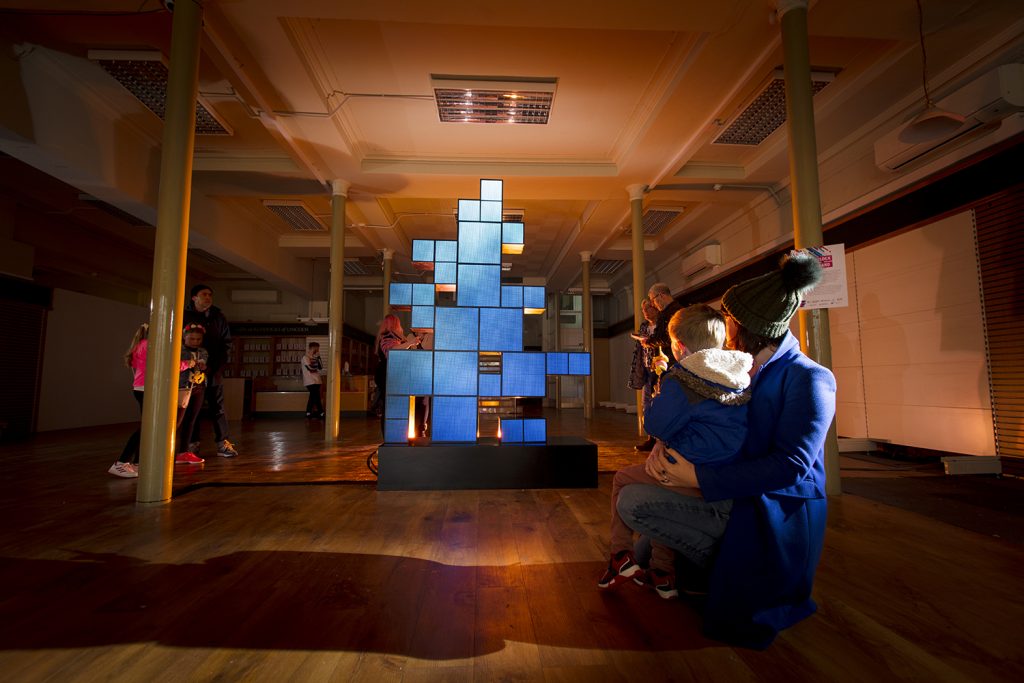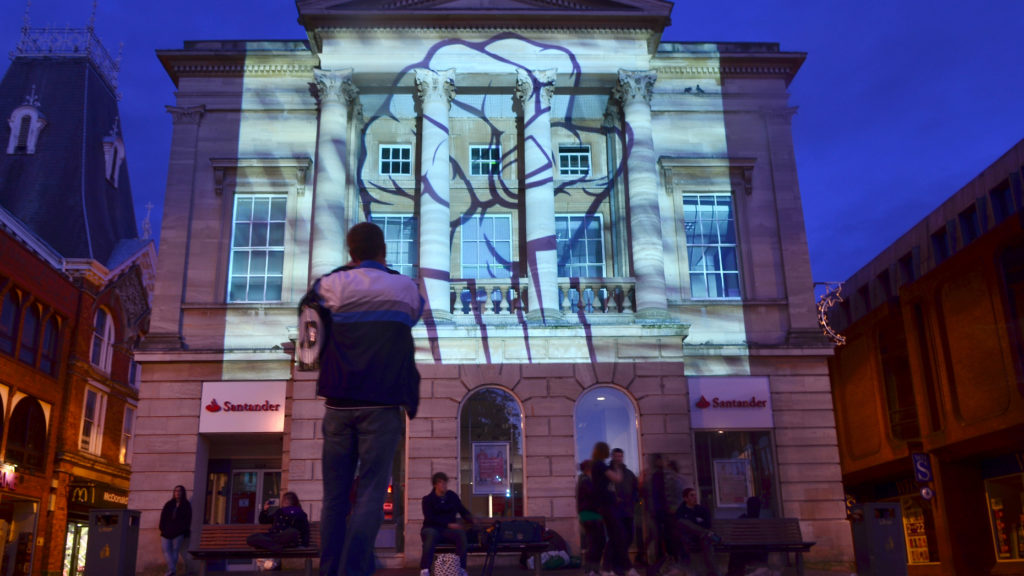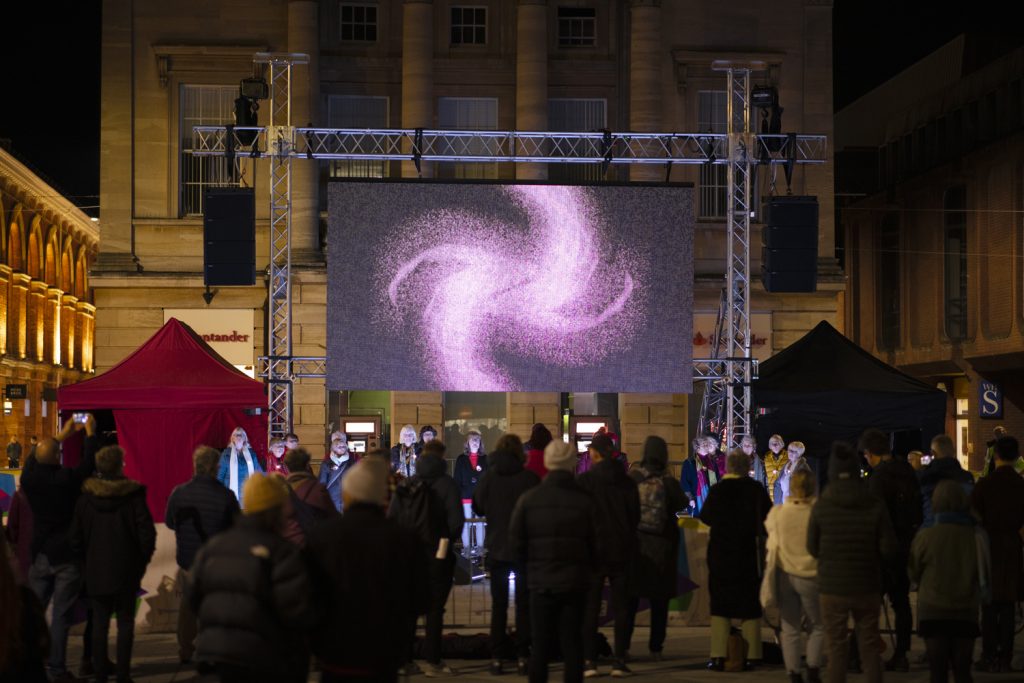Only the impossible is worth achieving
2021 marks the tenth anniversary of Frequency Festival, an ambition we at Threshold aspired to back in 2011 without knowing quite how we would pull that off. It also marks Threshold Studios’ 23rd anniversary. It makes all the Threshold team immensely proud to have participated in those endeavours and to have recently battled through the twin storms of austerity cuts and the pandemic to be here on the streets of Lincoln once again.
I’ll leave it to others to talk about the present and the future, about the importance of the festival in city partnerships and Lincoln’s cultural ambitions. Instead, I thought I’d take a moment to reflect on what it meant to me personally to have been involved in such an adventure. I’m using the past tense because a year ago I decided to step down as Co-Director of both Threshold and Frequency, partly because of personal health issues and partly because I had a plan to return to my own creative practice, a plan that was brought forward by a couple of years by the national lockdown. In adversity, there is always opportunity. That’s not to say there is no sacrifice, and there’s been plenty of that since the 2019 festival, but the key to long-term survival is being adaptable, spotting opportunity and taking bold steps in uncertain times.

There’s a passion the three Co-Directors share for widening access to the arts, for spotting talent with a good idea and for building a team around that talent and raising the money to make something happen. We can’t help it. We’d been doing it for 13 years before Frequency was born. We brought that passion to the commissioning of work for Frequency and one thing I’m immensely proud of is the level of connection we’ve made with all the artists who have exhibited with us. We care about their work, we want to champion them, to bring them to the attention of people who might also find they love it but would never have seen it if it wasn’t for us placing it in their shopping centre, their local church, the castle, the cathedral, a gallery or a city square. Our need to sing loud about the value of art for everyone is coupled with a shared belief that art can have a social purpose, that art is a language that everyone has the right to speak. Yes, some may be more eloquent than others, but sometimes it’s what you’ve got to say that counts, not so much how well you say it.

This year the Turner Prize caused controversy by making a shortlist of five such organisations that put social purpose and collective voices at the heart of their practice. It’s a heartening sea-change I welcome. It’s not easy to get the art establishment to accept the idea that the more colloquial expressions of art can have an equal validity to the works of the professionally trained artist. Frequency represents an egalitarian space where those distinctions are not made for the viewer. Everyone shares equal billing in the programme with no excuse or apology. I’m proud of that. And for the programme to be meaningful to the city’s residents we felt it was essential that there should be representation from their collective voices, the artists and communities that surround the festival. We believed our job was to remove the barriers to art for those who thought it wasn’t for them. We weren’t trying to change their minds about it; instead we look for the context where art reveals how it is relevant to their lives. Lincoln let us experiment with that idea. And from day one we always said there has to be room for the experimenters, for the unpolished thought, the art held together with rubber bands and hope with all the wires hanging out the back. The digital revolution was always about so much more than the tech – for us it was about the access artists now had to all the discarded electronic gear that had been so prohibitively expensive before, it was about the transformation of the audience / artist dynamic brought about by social media platforms. We made space for that. We didn’t have all the answers upfront but Frequency allowed for us to try some things to find them. And as festival directors we also shaped a curatorial model that would encourage the city to get involved in its own festival programming. We championed new curators and arts collectives, opened the door to artists and curators to champion their heroes or just come pitch us an idea. It would be our job to somehow weave those disparate threads together into a coherent context for our audiences. These principles were at the core of our ambition for Frequency from day one. I’m proud those principles remain.

Personally, over the past ten years of Frequency I got to meet and work with some great artists, I got to travel and visit many more we’ve yet to feature in the programme, talk to them about their work, come to understand their journey and watch it evolve. I made good friends and experienced a world of wonders expressed through a vast range of cultural perspectives. I feel I’ve played my part in something special. Frequency’s future faces challenges, but then it always has, but Sam and Uzma have a team around them at Threshold, at Arts Council England and among Lincoln’s city and county partners which means the will is there to take this initiative forward into its next ten years without me. And that’s freed me up to do something I’ve not had time to do for 20 years – concentrate on my own artistic practice.
Thank you Frequency for aiding me to achieve some of my greatest ambitions. And thank you Arts Council England, University of Lincoln and Lincoln itself and all its venues, heritage sites and people for putting your faith in us. But most of all, thank you Sam and Uzma and the whole Threshold Studios team, past and present. When we started that journey back in 1998 I never could have guessed what it might have led to. It was tough sometimes and it was always stressful but I wouldn’t have missed a moment of it for the world.
I had a mantra for myself back when I was 20 and just starting out on my journey in the arts. Writing this brought it back to mind. I was a working class lad who left school a few days after his sixteenth birthday, living on the back edge of beyond with no qualifications to speak of and no prospects worth the name. Reaching for the opportunities I could see from where I stood back then was never going to get me anywhere. I had to reach beyond the possible. Hence the mantra; Only the impossible is worth achieving.
Job Done!
Barry Hale
Festival Co-Director, Frequency Festival (2010-2019)
Co-Founder & Artistic Director, Threshold Studios (1998-2020)
On the Nostromo, heading upriver for the Heart of Darkness
21.9.21
